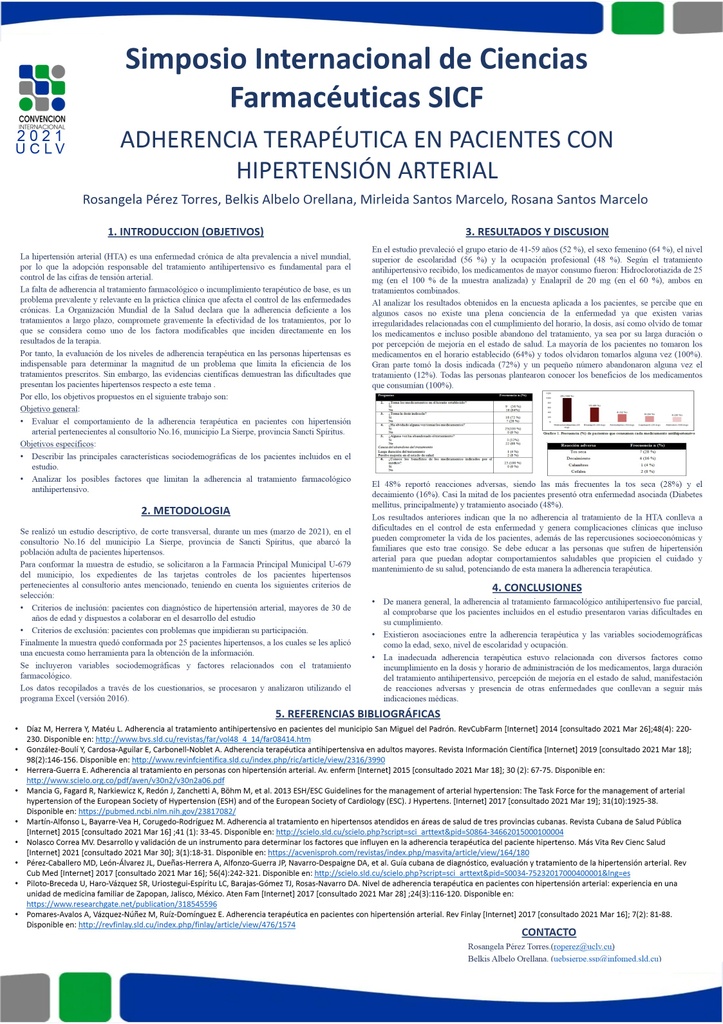Executive Secretary

Simposio Internacional de Ciencias Farmacéuticas
SICF

Resumen
Introducción: La hipertensión arterial (HTA) es una enfermedad crónica de alta prevalencia a nivel mundial, por tanto, la adopción responsable del tratamiento antihipertensivo es fundamental para el control adecuado de las cifras de tensión arterial. Objetivo: Evaluar el comportamiento de la adherencia terapéutica en pacientes hipertensos. Materiales y métodos: Se realizó un estudio descriptivo, transversal en 25 pacientes del consultorio 16 de La Sierpe, Sancti Spíritus, en marzo 2021. Se estudiaron variables sociodemográficas y factores relacionados con el tratamiento farmacológico de la HTA. Se utilizó la encuesta como instrumento de recogida de información. El análisis de los datos obtenidos se realizó en Excel. Resultados: Predominó el grupo etario de 41-59 años (52%), los sujetos del sexo femenino (64%), mayor nivel de escolaridad (56%) y los profesionales (48%). Los medicamentos de mayor consumo fueron Hidroclorotiazida 25 mg (100%) y Enalapril 20 mg (60%). La mayoría de los pacientes no tomaron los medicamentos en el horario establecido (64%) y todos olvidaron tomarlos alguna vez (100%). Gran parte tomó la dosis indicada (72%) y un pequeño número abandonaron alguna vez el tratamiento (12%). Todas las personas plantearon conocer los beneficios de los medicamentos que consumían (100%). El 48% reportó reacciones adversas, siendo las más frecuentes la tos seca (28%) y el decaimiento (16%). Casi la mitad de los pacientes presentó otra enfermedad y tratamiento asociado (48%). Conclusiones: La adherencia al tratamiento antihipertensivo fue parcial al presentarse varias dificultades en su cumplimiento, lo cual estuvo relacionado con diversos factores.
Abstract
Introduction: Arterial hypertension is a highly prevalent chronic disease worldwide; therefore, responsible adoption of antihypertensive treatment is essential for adequate control of blood pressure levels. Objective: To evaluate the behavior of therapeutic adherence in hypertensive patients. Materials and methods: A descriptive, cross-sectional study was carried out in 25 patients from the office 16 of La Sierpe, Sancti Spíritus, in March 2021. Sociodemographic variables and factors related to the pharmacological treatment of arterial hypertension were studied. The survey was used as an instrument for collecting information. The analysis of the data obtained was carried out in Excel. Results: The age group of 41-59 years (52%), female subjects (64%), higher level of education (56%) and professionals (48%) predominated. The most widely used drugs were Hydrochlorothiazide 25 mg (100%) and Enalapril 20 mg (60%). Most of the patients do not take the medications on the established schedule (64%) and all have forgotten to take them at some time (100%). Most take the prescribed dose (72%) and a small number have ever stopped treatment (12%). All the people raised to know the benefits of the drugs they consume (100%). 48% reported adverse reactions, the most frequent being dry cough (28%) and decay (16%). Almost half of the patients present another associated disease and treatment (48%), in addition to that indicated for arterial hypertension. Conclusions: Adherence to antihypertensive treatment was partial, as there were several difficulties in its compliance, which is related to various factors.
Sobre el ponente

MsC. Mirleida Santos Marcelo

